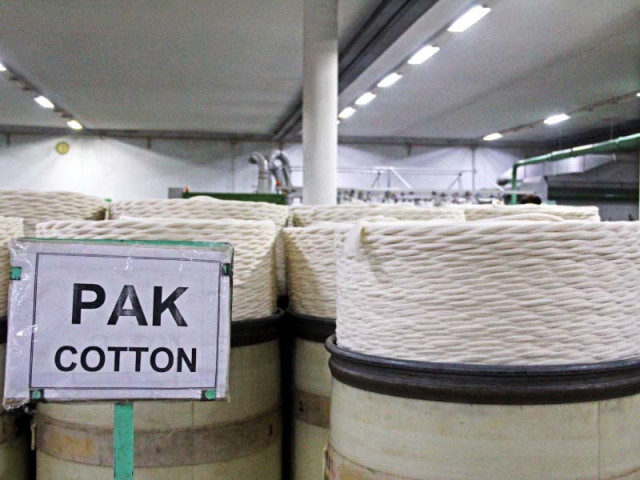Increased cost of doing business: No progress in talks with textile industry
APTMA’s strike call for August 7 stands, govt refuses to accept demands

The textile industry has long lamented the increased cost of doing business and demanded the withdrawal of electricity surcharge and gas cess. PHOTO: AYESHA MIR/EXPRESS
Negotiations between the government and textile industry representatives remained inconclusive on Saturday after Finance Minister Ishaq Dar refused to accept demands such as the withdrawal of electricity surcharges and gas cess.
As a result, the All Pakistan Textile Mills Association (Aptma) refused to withdraw its August-7 strike call, which would further compound problems of the beleaguered federal government that is already struggling to cope with a countrywide shutter-down strike by traders.
The agitation strategy adopted by Aptma and All Pakistan Anjuman Tajaran has dented PML-N’s pro-business image. Aptma blamed the government for a hostile business environment and negative growth in exports. Its forecasts for the next five years also show that the situation will not improve.
Meanwhile, the reasons for the strike call are different in both cases. Aptma’s case seems to be more genuine and serious, as they lament the increasing cost of doing business, resulting in an annual loss of $3.5 billion in exports - an amount that is more than half the sum Pakistan will receive under the three-year IMF bailout programme.
On the other hand, traders want to avoid the tax net and are insisting on the withdrawal of a 0.3% levy the government has imposed on all banking transactions worth over Rs50,000 a day carried out by non- filers.
Aptma’s demands
Finance Minister Ishaq Dar has constituted various committees to resolve complaints about high electricity, gas tariffs and other taxation issues, said SM Tanveer, Aptma chairman, while talking to the media after the meeting.
He said at this point Aptma cannot take back its strike call, indicating that he was not satisfied with the outcome of the three-hour long meeting.
Aptma asked the government to withdraw various surcharges on electricity for the textile sector, as it refused to bear the burden of inefficiencies and theft. Aptma claimed that these surcharges have increased the cost of doing business by another 3%.
The industry is paying Rs14.5 per unit, as compared to Rs7.3 per unit electricity cost for industries in Bangladesh and Rs9 in India, said Tanveer.
Aptma questioned the Rs14.5-per-unit tariff, particularly when crude oil prices have halved in the last three years. When the crude oil peaked at $112 a barrel, electricity tariffs for the industry were Rs9.8 per unit.
“We cannot export taxes and levies to international buyers of textile and clothing products,” said Tanveer. The industrialists also demanded withdrawal of the Gas Infrastructure Development Cess and proposed increase in gas tariffs. According to another demand, the government should exempt textile exports from all kinds of taxes, duties, surcharges, levies and cess.
Tanveer said the government has increased the burden of the textile industry by another Rs165 billion in the form of electricity surcharges, gas cess and taxes from July this year, which it can no longer bear.
The government’s side
“The government cannot reduce electricity and gas rates for a specific industry,” said Haroon Khan, Special Assistant to Prime Minister on Revenue. He, however, said that the textile industry’s problems were genuine and it has become uncompetitive as compared to regional peers. Khan said any incentive package for the industry will be linked with new investment, as the textile sector has not invested in the last five years.
Blockage of over Rs200 billion refunds is another major issue faced by the industry, said SM Muneer, the Trade Development Authority of Pakistan (TDAP) chief executive officer. He said Dar has promised to clear the outstanding refunds before the end of this month.
Aptma has estimated the opportunity cost of refunds in the range of 0.3% to 1.8%, the highest for the weaving industry.
For the last four years, textile exports have been constantly on decline. Textile exports fell by 13.5% during the recently-ended fiscal year 2014-15. At present 30% capacity of the spinning mills is impaired, Aptma informed Dar.
Published in The Express Tribune, August 2nd, 2015.
Like Business on Facebook, follow @TribuneBiz on Twitter to stay informed and join in the conversation.



















COMMENTS
Comments are moderated and generally will be posted if they are on-topic and not abusive.
For more information, please see our Comments FAQ